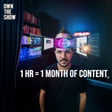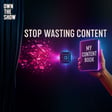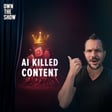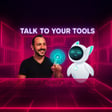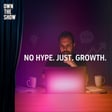
AI In Content Marketing: Turning Process into Progress
In this episode of the AI-Driven Marketer, Dan Sanchez is joined by Marc Angelos, a seasoned entrepreneur and content marketer, to delve into the aerial view of artificial intelligence in the marketing realm. They tackle the inherent complexity of AI, misconceptions held by company founders, and the evolution of marketers' roles in the age of automation. From the impact of DALL E on image editing to the nuances of voice-modelling AI, Dan and Marc provide a roadmap for integrating AI into business processes seamlessly. With insights on the "Eliminate, Automate, Delegate" principles, and discussion of custom GPTs for content creation, this episode offers a wealth of knowledge for entrepreneurs and marketers ready to harness AI's potential. Tune in to demystify AI's transformative power and discover how to stay ahead in the ever-changing skies of digital marketing.
Timestamps:
00:00 AI news show may change its name.
05:50 Content marketing agency owner discusses writing vs. video.
07:35 Learning about AI through fast trial and error.
10:11 Use AI to automate repetitive tasks for efficiency.
12:42 Using LinkedIn data for my own content.
17:13 AI can streamline creating a lot of content.
22:04 Blog posts for SEO are essential tasks.
25:42 Founders often act intuitively without realizing it.
28:59 Creative scenarios for future, automated by AI.
31:34 "Seeked marketing automation process, found guru executive."
33:36 Analyze, optimize, standardize, mechanize for work improvement.
38:08 Automatically enhance voices and match lip movements.
39:31 AI voice lacks human-like pauses and inflections.
45:19 Marketing work often involves discussing AI applications.
48:04 Workers need to adapt to AI technology.
49:49 Book identifies 3 distinct personas within individuals.



![What’s Your Authority Score? [The 5-Factor Test] image](https://media.zencastr.com/cdn-cgi/image/width=112,quality=85/image-files/630c9f06819f8b3dba5fa460/cfbaccba-f587-45de-a41f-e2c99c15e2a5.png)
![The Audience Growth Engine [Full Framework] image](https://media.zencastr.com/cdn-cgi/image/width=112,quality=85/image-files/630c9f06819f8b3dba5fa460/46b84fd1-e856-4687-9aee-6b4a7e0bc7ff.png)

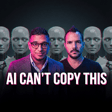
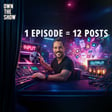
![The "Dream 100" Execution Plan [Google Sheet System] image](https://media.zencastr.com/cdn-cgi/image/width=112,quality=85/image-files/630c9f06819f8b3dba5fa460/fcd89374-76a4-4e58-a2e3-2bb7ddda4364.png)
